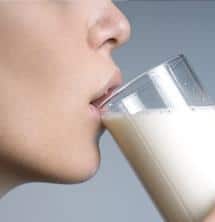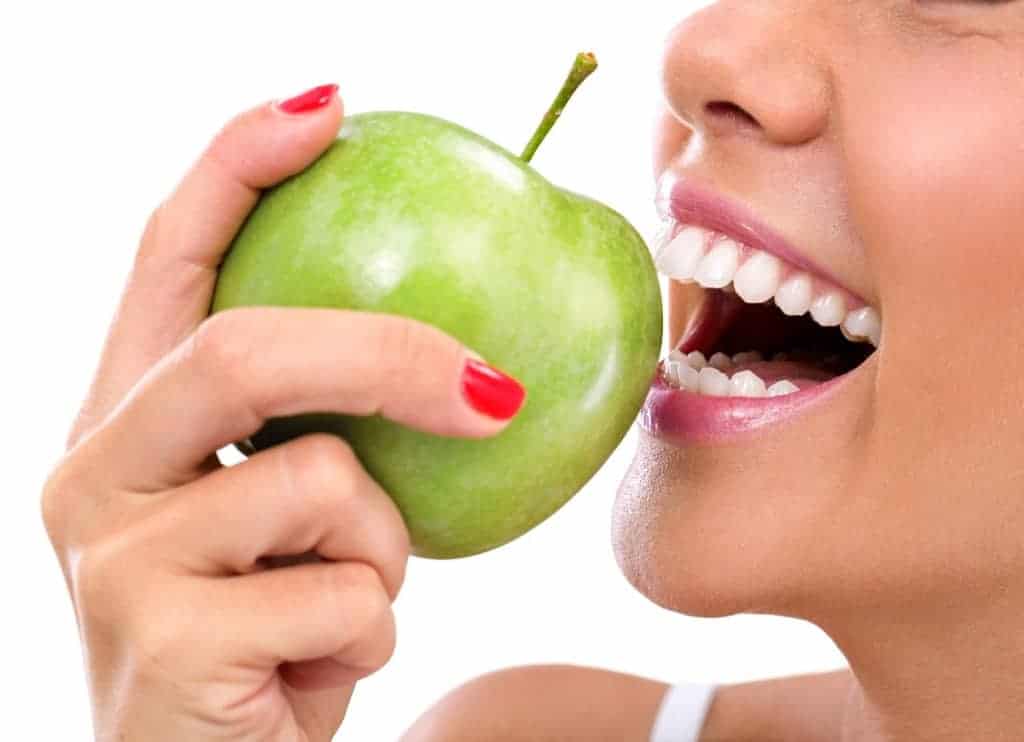What you eat not only affects your general health, but directly impacts your oral health too. Changes in your mouth start the minute you eat certain foods. Problems such as bad breath, stained or brittle teeth, tooth decay and periodontal disease may be a direct result of what you’re eating or, not eating.
Here are some tips to keep your teeth and gums healthy:
- Hydrate! If you drink enough water (especially fluoridated water) the accumulated food particles and debris will wash away from the mouth properly and lower your chance of tooth decay. As a side benefit, water also encourages saliva production that is very important for neutralizing the acids in the mouth.
- Calcium is extremely important in order to keep your bones and teeth are strong. Your teeth and jaws are made mostly of calcium and without enough of it in your diet, your risk developing gum disease and tooth decay. Foods that are a great source of calcium: unsweetened milk and yogurt, cheese, oysters, almonds, and beans.

- Vitamin D helps your body absorb the calcium that keeps your jaw bones and teeth strong. Other side effects caused by a lack of Vitamin D include dry mouth and burning mouth syndrome which leaves a metallic and bitter taste in the mouth. To increase your Vitamin D intake, drink milk and eat egg yolks and fish!
- Onions have a strong antibacterial effect when consumed raw. So mix them into your salads and meals so they can fight off the bacteria in your mouth. If the bacteria in your mouth are being destroyed, the chance of developing tooth decay is minimal.
- Iron deficiency can cause your tongue to become inflamed or sores may form inside your mouth. Make sure you have enough iron in your diet to prevent deficiency. Iron rich foods include liver and red meat, bran cereals, nuts and spices.
- Mint and Parsley are natural breath freshener and also a good anti inflammatory that protects your gums.
- Firm and crunchy fruits and vegetables (such as apples, celery and carrots) are great. They have a high water content which dilutes the effects of the sugars they contain and stimulate flow of saliva that wash the food away and buffer the acid.
- Vitamins B3 (niacin), B12, and B2 (riboflavin) are essential for your oral health. A lack of vitamin B3 causes bad breath and canker sores. To raise your B3 levels, eat chicken and fish. A lack of B12 and B2 causes mouth sores on the lips, tongue and gums and cracking of the skin at the corners of the mouth. A good source of B12 is red meat, chicken, liver, pork, fish as well as dairy products like milk, yogurt, and cheese. B2 is found in foods such as spinach, calf liver, almonds and yogurt.
- Avoid all Sodas because they contain phosphorous and carbonation, which wears away enamel on your teeth leaving them brown and stained. (Regular sodas also cause cavities because of their extremely high sugar content: see below tip).
- Avoid cavity causing foods: all sugary snacks (ie cookies, cakes, and candy), sticky chewy foods (such as raisins, granola bars and dried fruits), sodas and carbohydrates (such as chips, white bread, muffins and pasta). These foods contain a high amount of sugar and the bacteria in your mouth convert these sugars to acids. The acids then begin to attack the enamel on teeth, starting the decay process. The more often you eat and snack, the more frequently you are exposing your teeth to the cycle of decay. Some tips to minimize the damage when these foods are eaten include:
- Brush your teeth right after eating foods that are high in sugar or carbohydrate content.
- If a tooth brush isn’t handy, drink a lot of water: this will help wash some of it away.
- Chew sugar free Xylitol gum: this will stimulate the saliva in your mouth to help wash the sugar and bacteria away.
Keeping your diet healthy and full of minerals and nutrients helps your body’s tissues resist infection. The presence of harmful foods or the lack of essential nutrients can have damaging effects, particularly on the mouth and teeth. This may contribute to oral disease and infection or other side effects like bad breath and poor esthetics. Follow these tips and be on your way to optimum oral health!
Contact Us at Modern Dentistry for additional information on your Oral Health.


